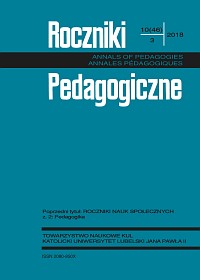The Importance of Functional Diagnosis in Education of Disciple with Special Educational Needs
Main Article Content
Abstract
The aim of the article is to define and describe the functional diagnosis as a model for providing psychological and pedagogical assistance to students with special educational needs (SEN). Due to the use of this term in many scientific contexts (pedagogy, psychology, medicine), as well as in the area of diagnostic and therapeutic practice, it is difficult to give its coherent explanation. The analyzed methods of applying the concept of functional diagnosis indicate a selective understanding of the role and tasks attributed to educators, psychologists, teachers and other specialists. Because of that the main value of the functional diagnosis, namely the complexity of support, is not sufficiently implemented, which directly translates into the quality of education of students with special educational needs.
Article Details
References
Byra, S. (2017). Pozytywne zmiany w percepcji kobiet z nabytą niepełnosprawnością ruchową. Roczniki Pedagogiczne, 9 (45), 19-41.
Cook, B.G, Cook, S.C. (2011). Unravelling evidence-based practices in special education. Journal of Special Education.
Cook, B.G., Odom, S.L. (2013). Evidence-Based Practices and Implementation Science in Special Education. Exceptional Children, 79, (2), 135-144.
Domagała-Zyśk, E., Knopik, T., Oszwa, U. (2017a). Diagnoza funkcjonalna rozwoju społeczno-emocjonalnego uczniów w wieku 9-13 lat. Warszawa: ORE.
Domagała-Zyśk, E., Knopik, T., Oszwa, U. (2017b). TROS-KA. Diagnoza i wspomaganie rozwoju społeczno-emocjonalnego uczniów w wieku 9-13 lat. Podręcznik dla wychowawców i nauczycieli. Warszawa: ORE.
Gresham, F., Quinn, M. i Restori, A. (1999). Methodological issues in functional analysis: Generalizability to other groups. Behavioral Disorders, 24, 180-182.
Gresham, F., Watson, T. i Skinner, C. (2001). Functional behavioral assessment: Principles, procedures, and future directions. School Psychology Review, 30(2), 156-172.
Hanley, G., Iwata, B. i McCord, B. (2003). Functional analysis of problem behavior: a review. Journal of Applied Behaviour Analysis, 36, 147-185.
Hejnicka-Bezwińska, T. (2015). Pedagogika. Podręcznik dla pierwszego stopnia kształcenia na poziomie wyższym. Warszawa: Difin.
ICF – Międzynarodowa Klasyfikacja Funkcjonowania Niepełnosprawności i Zdrowia (2009). Warszawa: Centrum Systemów Informacyjnych Ochrony Zdrowia.
Iwata, B. i Beavers, G. (2013). Thirty years of research on the functional analysis of problem behaviour. Journal of Applied Behavior Analysis, 46, 1-21.
Iwata, B., Dorsey, M., Slifer, K., Bauman, K. i Richman, G. (1994). Toward a functional analysis of self-injury. Journal of Applied Behavior Analysis, 27, 197-209.
Knopik, T. (2018). Diagnoza funkcjonalna i planowanie pomocy psychologiczno-pedagogicznej – działania postdiagnostyczne. Warszawa: ORE.
Knopik, T., Oszwa, U., Domagała-Zyśk, E. (2018, w druku). Diagnoza kompetencji emocjonalno-społecznych uczniów zdolnych w środkowym wieku szkolnym z wykorzystaniem baterii TROS-KA – doniesienie z badań. Ruch Pedagogiczny.
Kozielecki, J. (2007). Psychotransgresjonizm. Nowy kierunek psychologii. Warszawa: Wydawnictwo Akademickie „Żak”.
Mitchell, D. (2016). Sprawdzone metody w edukacji specjalnej i włączającej. Gdańsk: HARMONIA.
Mostert, M.P., Crockett, J.B. (1999-2000) Reclaiming the history of special education for more effective practice. Exceptionality, 8(2), 133-143.
Neisser, U. (1979). The concept of intelligence. Intelligence, 3, 217-227.
Palka, S. (2018). Wiązanie podejść metodologicznych w pedagogice teoretyczno-praktycznej. Kraków: Impuls.
Oszwa, U., Knopik, T., Domagała-Zyśk, E. (2018, w druku). Zasoby odpornościowe uczniów w środkowym wieku szkolnym a ryzyko niedostosowania społecznego. Ruch Pedagogiczny.
Pytka, L. (2005). Pedagogika resocjalizacyjna. Warszawa: APS.
Scott, T., Bucalos, A., Liaupsin, C., Nelson, C., Jolivette, K. i DeShea, L. (2004). Using functional behavior assessment in general education settings: Making a case for effectiveness and efficiency. Behavioral Disorders, 29(2), 189-201.
Wang, M., Lam, Y. (2017). Evidence Based Practice in Special Education and Cultural Adaptations: Challenges and Implications for Research. Research and Practice for Persons with Severe Disabilities, 42(1), 53-61.
